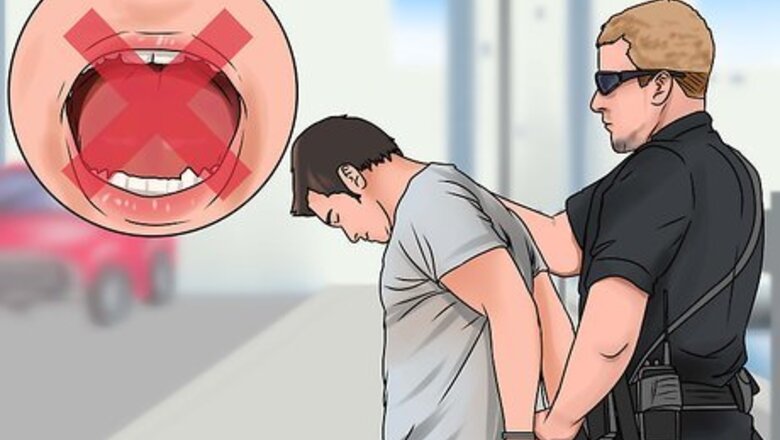
views
Getting Ready for Prison
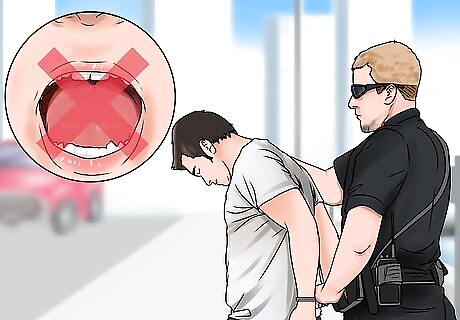
Bite your tongue. If the judge doesn't allow you to self-surrender to the prison where you have been designated, you will be handed over to the U.S. Marshals Service. Do not speak to a Marshal or let them overhear a conversation about your case or anything else for that matter. Nothing you can say will make the situation any better and it might even make things worse: just because you have already been convicted doesn't mean that you can't be charged with something else. Don't ever forget that anything you say can become evidence which can be used against you; keep your mouth shut as much as possible.
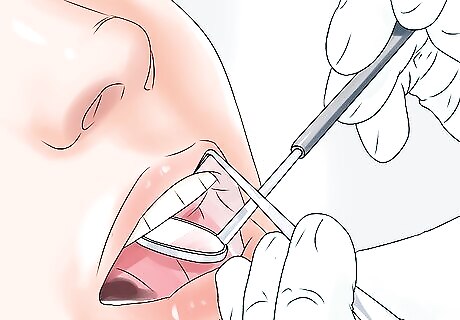
Be sure to take advantage of any medical care outside of prison if you have enough time. The choice and quality of care are significantly better outside of prison. Certain treatments that you take for granted might not be available in prison, or won't be nearly as good. After all, if you're in prison and you don't like the prison dentist, where else are you going to go to have your teeth fixed? So, if there's time to do it, consider having a dental check-up before you self-surrender and get anything important fixed. Also, if you wear glasses you may want to have an eye exam and get new lenses if you need them. As with dental care, you've got a better choice of lenses and frames outside prison. If you're lucky enough to have some time before prison, get a check-up or address any medical issues you've been having. Though you'll get medical care in prison, it's better to get medical attention before you're locked up.

Line up some reading material. Most federal prisons allow magazines and books to be sent to inmates—on the condition that they are sent directly from the publisher or a retailer like Amazon. If you're self-surrendering and you know which prison you're going to be in, consider taking out a subscription for magazines/journals or ordering a couple of books from Amazon to read. Do this a couple of days before you self-surrender. Alternatively, give your friends and family a shopping list of books/magazines and let them take care of ordering things. There's no web access in prisons, so make your selections before you enter prison. Though choosing reading material may be the last thing on your mind before you start your time in federal prison, being prepared for reading material (as soon as you're allowed to have it) can help you feel less lonely and more comforted when you begin your sentence.

Keep your guard up if you are sent to a hold-over facility or a prison camp. If you are placed in transit to prison, you may be sent to a hold-over facility. The facility you are sent to may be determined by whether you are designated for a low, medium, or high-level prison. Some of the living conditions in these facilities are not ideal, such as being placed in a two-man cell with up to three other inmates for 23 hours a day, being allowed out to rec in an enclosed area for one hour, and only being allowed to shower for five minutes twice a week. Each facility has its own rules—just be prepared for the extreme conditions you may face. Be especially cautious during this time. You will be with other people who are in a state of uncertainty and more likely to be volatile than they will be once they get settled into the prison routine.

Learn the rules. Try to find out as much as possible about how the system works in the prison you will be living in. If there is an official rule book for the prison, read it. You can be punished for breaking a rule that you didn't know existed. Breaking the rules will not only aggravate personnel but inmates as well. It makes life harder for everyone. Ignorance of the rules is no defense. Information is power.
Learn as much as you can about life in federal prison before entering. While the Bureau of Prisons does put out some basic information about life in prison, books like the Federal Prison Handbook and certain websites provide decent information to help you prepare. Know what kind of prison you might get sent to first. There is a big difference between a minimum security prison than a maximum security or Supermax.

Bring the maximum amount of money that you are allowed with you to prison. You may be allowed a certain amount of money (up to $500). This money will be used to buy supplies you may need while incarcerated. This is called putting "money on your books." You will need money for supplies such as stamps, envelopes, snacks, and also hygiene supplies. Cash is not necessary; in fact, it will be confiscated. It's best to go in with a US Postal Service money order as they are widely accepted in all prisons (federal and state). Additionally, don't let anyone know that you have money. Pretend that you're poor and penniless. That way there's no danger of other prisoners trying to extort money from you.
Surviving in Prison
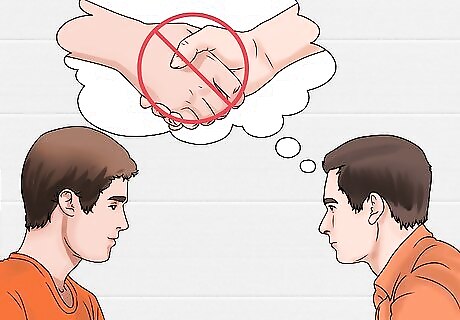
Don't trust anyone. That goes for guards, other prison officials, and the person in the cell next door. If someone is being nice to you, ask yourself, "What's in it for them?" They almost always have some hidden motives that you don't know about. In prison, nothing is free; for instance, if someone gives or loans you something, you will probably have to pay it back with a hefty rate of interest added. If you can't pay, they may demand a favor that could get you into big trouble, such as hiding contraband in your cell.

Hide your emotions. If you want to look tough, do not show fear, anger, happiness, or pain. Emotions are your worst enemy because they reveal your weaknesses. Both inmates and guards prey on weakness. Don't give them the opportunity to do so. If someone can figure out what makes you angry, they can use that knowledge to manipulate you. In the same way, if someone knows what makes you happy, they can try to ruin it for you. And because they are around you 24/7, they have unlimited opportunities to test their manipulative skills on you.

Make use of your cellmates. Do not be overly friendly with your cellmates, but do ask some questions. Some may have been in prison before and will be able to give you information about the prison you are being sent to as well as the system itself. You will have to judge for yourself whether to believe any of the information. Use common sense and try to figure out if that person has a reason to lie or mislead you. Some convicts will try to intimidate new inmates or mislead them for fun. Be careful.
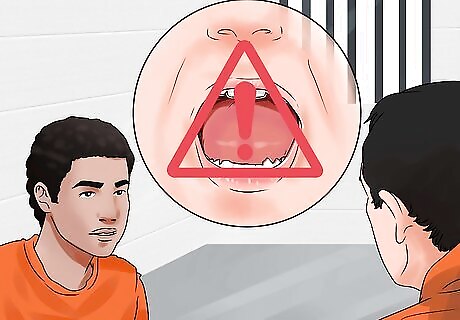
Choose your words carefully. Anything you say to guards or prisoners, no matter how innocent you think it is, can be used to hurt you, manipulate you, or be taken out of context. Avoid discussing dangerous conversational topics. Otherwise, it can easily get you into trouble. Obvious subjects to steer clear of are religion, politics, racial issues, or your own personal feelings about someone or their family and friends. Don't refer to the people doing time with you as inmates. Some of the prisoners you'll encounter may have a short temper or are mentally ill, of low intelligence, or just plain bad. Prisoners like that don't have a warning written on their forehead—they look like regular guys. You can easily be misunderstood or deliberately misquoted by someone who's trying to provoke trouble. What starts out as a petty argument over a trivial issue can turn into someone bearing a strong personal grudge against you. Don't be paranoid. Be aware that things may not be what they seem, such as the prisoner who tells you that gay or black people are like everyone else, then asks what your opinion is—he's just testing your attitude or yanking your chain.

Always be polite and respectful to guards and other prison employees. If you give them a reason to hate you, they can make your life even harder than it already is; don't give them a stick to beat you with. It's true that some prison employees are better than others, but even so, never forget whose side they're on—it certainly isn't yours. You need to get in your head that the staff are always right and you need to do what they say. Even if you know something is wrong, it is best to merely follow the order; if you have a problem with it, you can always address it later. For example, if you work as a server in the kitchen and a staff foreman tells you to clean tables in the dining room, though you know it's not part of your duties, the best thing to do is simply clean the tables. Don't do anything that makes staff feel challenged or intimidated; they have various ways of making you pay for that mistake.
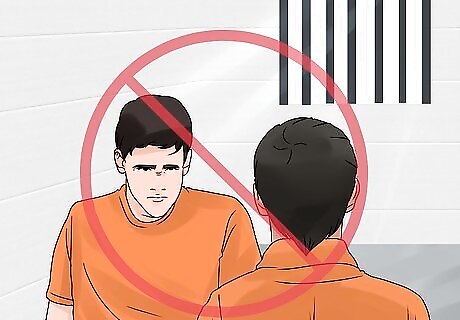
Don't stare at other prisoners. Although you might simply be curious about them, the other person can completely misinterpret this. In prison, if someone stares at you it usually means they feel intense hostility or disapproval towards you. Alternatively, staring is a way of showing sexual interest. It's ok to look at people, but don't stare at them; there's a clear difference between looking and staring. When you're walking to your cell, do not stare into the other prisoners' cells. This is considered an invasion of privacy and can get you in big trouble.
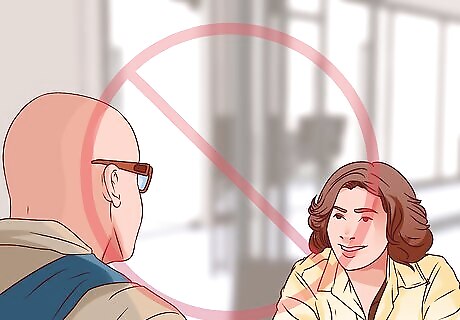
Don't be a snitch. People who tell tales to the guards or other prisoners are despised by everyone and can be physically attacked. The best thing you can do in prison is to see everything, hear everything, and say nothing. For instance, if a guard asks you about an incident involving other prisoners, claim that you were looking the other way and didn't notice or hear anything. While it may irritate the staff on some level that you aren't willing to snitch, they will likely understand. If you're known to get along well with prison staff, other prisoners could (wrongly) assume that you are a snitch. Don't talk to prison staff more than necessary; while it may be just an innocent conversation about the weather, other inmates won't perceive it that way.
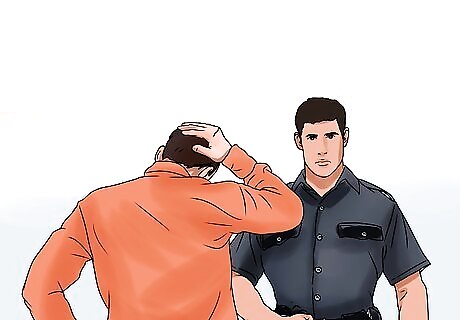
Don't ask the staff to solve your problems. The truth is, you can never go to the staff for assistance with issues you may have, or else you will have problems with inmates if you do. If you go to staff with a problem, the only thing they can do for you is put you in the Secure Housing Unit (SHU) as a protective custody inmate, and that will cause you trouble throughout your entire incarceration. If you complain to staff, you're stuck in no man's land between the staff and inmates; neither will help you. Try to get used to the fact that you have very few human rights in prison, and that you're largely powerless to change your circumstances.
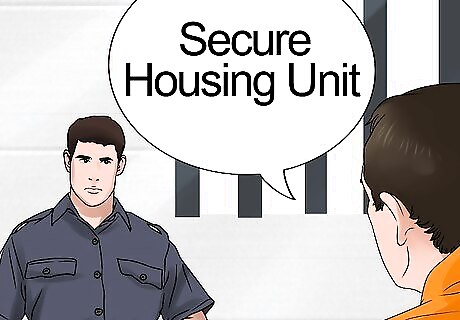
Ask to be placed in the Secure Housing Unit (SHU) only in extreme circumstances. When fights occur in prison, the participants may be placed in a segregation unit or be moved to a higher level of confinement, but it is extremely unusual for them to be charged with a crime, especially if all the participants were prisoners. Your legal protections in prison are severely curtailed by the system. The guards and administrators do not want anyone to make waves. Prison employees will punish you for making waves much more quickly than they will come to your aid. Sometimes the punishment will be official, in other cases, it will be more subtle, such as "forgetting" or "misplacing" something that you need. You always have the option to ask to be put in the hole for your protection. The hole is unpleasant, but it is relatively safe. Don't ask for this kind of protection unless you fear for your life, because if you go to the SHU you'll spend 99.9% of your time locked inside a cell.

Don't join a prison gang. Like the outside world, there are also gangs in prisons; however, prison gangs are far more prevalent and work very differently. Be mindful of gang members, but avoid joining a gang; gang members are soldiers, and gang leaders demand absolute loyalty. If you join a gang, you may be ordered to do something that will keep you in prison a lot longer; a gang member has no choice because aside from getting out of prison, there's only one way to quit a prison gang while in prison: to die. All prison gangs are separated firstly by the races they are typically associated with. Bloods/Crips/Black Guerilla Family (African-American); the Mexican Mafia (Mexicans); MS-13 (Salvadoran/Honduran/Guatemalan/Nicaraguan); White Supremacist/Nazi (Caucasian), etc. There are many different divisions.

Show allegiance to your race. It is crucial to your survival in the prison system to immediately show your allegiance to your race—though this doesn't mean you have to join a gang to do it. If you are some white suburbanite 19-year-old kid that pledged yourself as a crip, and you used to buy the dope you got busted selling from your crip homeboys in the projects, that doesn't mean you can link up with them in prison. If you're white and you walk in slapping high fives with the brothers before you shake hands with the white dudes, you're going to send a rift through the whole community. This doesn't mean you have to get a swastika on your forehead or "Blood for Life" tattooed on your chest. It simply means whichever race you are associated with, you seek them out first and introduce yourself. You get to know inmates of your race first. Especially the "important" figures within your race. You can be "friendly" with people of other races after that. In prison, blacks, Mexicans, Chicanos, Asians, and whites all look after their own. This isn't the time to be colorblind.
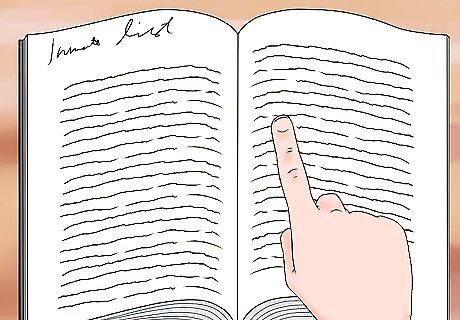
Seek out people from your hometown. In most federal facilities, there are inmates from all over the country. You can do an inmate search prior to turning yourself in. You'll be able to look through the prison inmate listing to see if you know anyone or where their home state is. When you get to your designated facility, you need to find other inmates who are from your city or state; these are your "home boys" and they will usually help you with things you have an immediate need for, such as basic hygiene items and shoes. But beware of your homeboys if there is anything wrong with you or your case, like if you are an informant, sex offender, or anything else frowned upon by inmates, in which case your homeboys will probably be the ones that will confront you on it. This could include assault, stabbing, or whatever else they think you deserve.
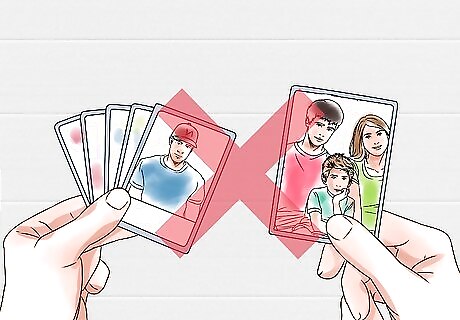
Respect the personal space of the other prisoners and don't let them invade yours. You will be tested and if you allow others to get too close to you for comfort, they will keep getting closer until your subservience is obvious. Have respect and never reach over someone else's plate at the mess hall for the pepper, salt, etc. Don't allow others to reach over your plate either, or you'll look like a pushover. Personal possessions like photographs, letters, and other stuff are very important when someone is in prison. So, never borrow or use something that belongs to another prisoner unless he's told you it's ok to do it. Touching someone's personal possessions without their permission is a no-no.

Become accustomed to the new rules. Above all, remember that the normal rules of the outside world simply don't apply any longer. When you're in prison, you're living on a different planet where all that matters to you is surviving the experience with as little damage as possible.




















Comments
0 comment